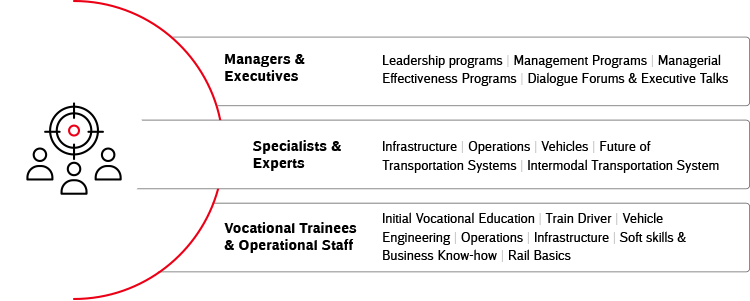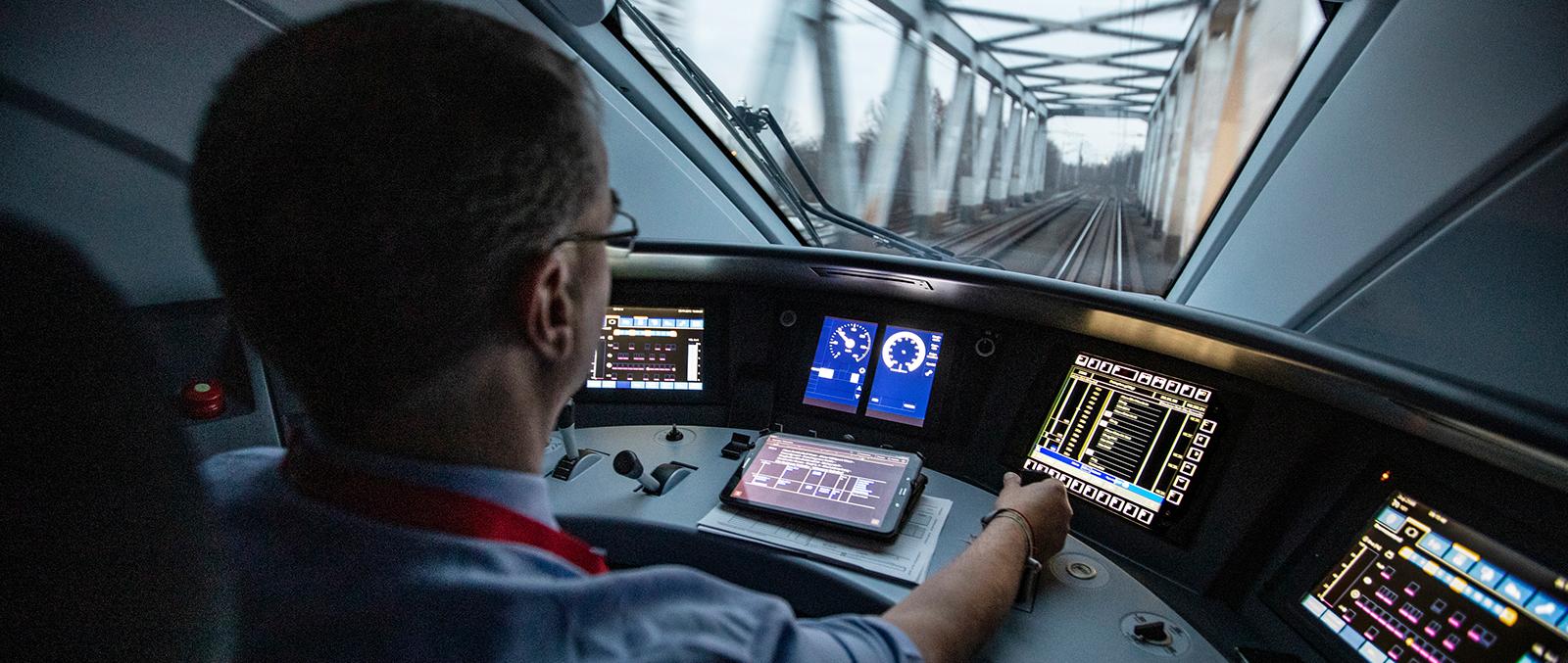Our services
We offer a wide range of services and products in the areas of Training and HR Consulting, from idea to operation.
Our Target Audience
We offer a wide variety of services and products to companies.
With our comprehensive training portfolio we can address the needs of various target groups, whether the focus be on technical or managerial knowledge. We have training courses and programs targeting:

Concerning the design of our trainings, all courses can be either taken separately or put together as modules to form a program. We offer our trainings in multiple languages and we can adapt them to consider cultural aspects.
The level of our courses and programs differs depending on the knowledge level and required skills. Here we differentiate between Fundamental and Advanced Training.
- Fundamental Training sessions involve the transfer of basic knowledge. No prerequisites are required. The objective of this training is to build a fundamental understanding of the respective topic.
- Advanced Training builds on fundamental training by expanding or enhancing knowledge in the respective field. The objective of the training is to deepen the respective topic and to build a comprehensive understanding.
Certification
Improve your chances to have better access to the rail market.
Attendance Certificate
An Attendance Certificate is a DB Rail Academy brand document that confirms successful participation in a training course or program. There is no evaluation system behind it and therefore no official evaluation or final examination. This is issued on the responsibility of the DB Rail Academy.
Recognized Certification/Degree
A Recognized Certification is a DB Rail Academy-specific document or official confirmation of successful completion of a certified education or training program. This is done on the basis of a DBRA-specific assessment system that includes learning objectives by comparing content with its application (transfer). The assessment includes daily assessment, project work, reports, presentations and/or tests by an expert. Our examination process has been approved by a neutral officially recognized certifying body.
A Degree is achieved after an academically oriented and long-term educational program or study. This includes at least one locally recognized document confirming compliance with legal and political standards. The certification gives access to higher positions and the possibility to take over certain professions and work areas. It is based on recognized and standardized content with a complex evaluation system that is offered at regular intervals.
Learning Formats and Methods
We have a large variety of formats and methods to assure the best learning results.
The choice of instructional format and method depends on various factors such as the learning content, the knowledge and/or skill level, the training objectives, and the target audience, as well as customer-influenced factors such as the location of the participants and availability of training facilities.
Online Training / Virtual Classroom
Just like in a real classroom, students participate in synchronous instruction in an online learning and web-based environment. Benefit: Local independence enables distance education. Although the trainer and students do not physically share the room, a conducive learning environment is created through interactive communication with and engagement of participants.
Practical Training
Practical training is training without theoretical input at any time. The training takes place in a real or simulated environment. The objective is to learn through a guided teaching method and learning by doing.
Programs
Programs are long-term training events that combine single products or modules together to make up an end product and that include a variety of training courses and topics. A program follows a defined structure and schedule. The objective of this type of course is to professionalize in an intensive and comprehensive manner by illuminating different sub-topics.
Study Tours
Study tours are small programs that are organized in Germany to gain insights into the rail business. Elements of a study tour are different theoretical input sessions, site visits and excursions, networking and evening events. The objective of a study tour is to combine a site visit tour of DB facilities with theoretical knowledge.
Lecture
In lectures, the teacher or expert plays a dominant role in knowledge transfer. The learners, on the other hand, consume the structured learning content. The objective is to introduce new content, reach a large number of employees at the same time or to build a common ground of knowledge. Another description is theoretical training.
Seminar
In seminars, an interactive treatment of a topic takes place under guidance of an expert (teacher, lecturer). The participants acquire knowledge through interaction with each other and with the expert. In this context, learning is the exploration of a topic.
Learning Nuggets / Tutorials
These are short training units offered online that condense knowledge and experience into bitesize chunks. They are useful for providing insights into a topic.
Individual work
Individual work supports diligence, power of concentration and autonomous work. It is suitable for repetition and memorization or to establish a routine.
Group work
Group work enables the training of problem-solving abilities and capacity for teamwork during discussions and common elaborations.
Case Study and Business Games
Cases portray real life problems involving decision making by students. They are used as a tool to facilitate learning in class and require discussions to work on a set of questions. Cases simplify complex issues. They improve analytical thinking, support communication and tolerance for different views, and students learn to defend on their own point of view in discussions.
Simulation
Simulation is highly interactive. Simulations are used in software training with the objective of giving learners confidence in their actions. Further, 3D-Simulations are used to replicate railway line or technical components.
Tests and Assessment
Training can include tests and assessment which test the learner’s basic knowledge at the beginning of a training or their acquisition of knowledge at the end of it.



